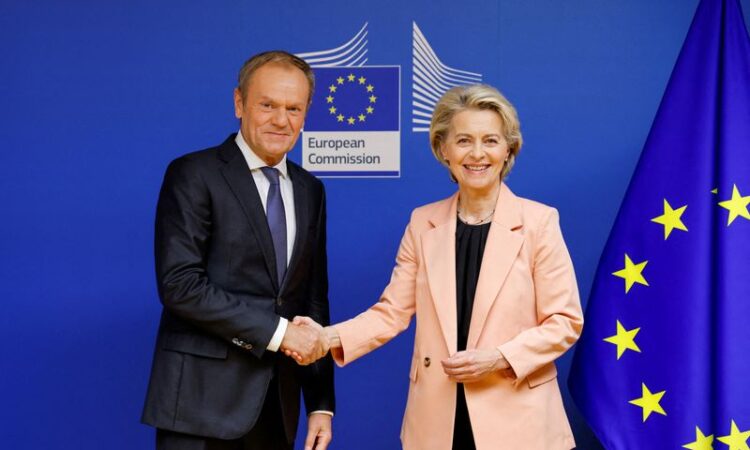
By Gabriela Baczynska
BRUSSELS (Reuters) – Poland’s new Prime Minister Donald Tusk got an early Christmas gift on Friday as the European Union promised to transfer a first batch of funds hitherto frozen over democratic backsliding, though larger payments were set to take time.
Fresh from being sworn in as the new prime minister after an eight-year rule by his nationalist rivals, Tusk arrived in EU hub Brussels vowing to restore the rule of law in the bloc’s largest eastern state.
During his visit, the bloc’s executive said it would transfer to Warsaw 5 billion euros ($5.5 bln) from Poland’s 60-billion-euro chunk of the bloc’s COVID recovery stimulus.
“I welcome your commitment to put the rule of law at the top of your government’s agenda,” European Commission President Ursula von der Leyen told a joint news conference with Tusk. “We will need to make up for lost time.”
She praised Warsaw’s aim to join the bloc’s European Public Prosecutor’s Office, something the previous government of the eurosceptic Law and Justice (PiS) party refused to do.
Tusk’s government also plans to split the posts of the justice minister and the country’s prosecutor general, a reversal of the set-up under PiS criticised as an example of putting the justice system under more direct political pressure.
In welcoming what he quipped was a Christmas gift from the EU executive, Tusk said Poland would rebuild democratic institutions after years of PiS rule that were also marked by bitter battles with the EU over democratic rights.
He added Warsaw has submitted a request for another 7 billion euros from the 60-billion-euro allocation.
THREAT OF VETO
The first transfer comes under an EU programme to help energy transition away from fossil fuels and is free of the bloc’s usual rule-of-law conditions.
To get more EU money, Poland now needs to make strides to restore the independence of the judiciary – something EU Justice Commissioner Didier Reynders said would take “some time”.
“There is the commitment. The message is very important about the rule of law,” Reynders told Reuters. “But that is not enough. We need to see the reforms. That will take some time.”
Reynders named ending proceedings against judges by a contested disciplinary chamber as an example of a fix that did not require a new law, something Tusk backers worry Poland’s president – an ally of the previous government – might veto.
In some cases, Reynders said Warsaw would need to go all the way to a potential presidential veto before resorting to alternatives like executive decrees, where possible.
Also at stake is a further 75 billion euros worth of development assistance assigned for Poland under the EU’s shared 2021-27 budget, which Warsaw was unable to access under PiS due to the bitter fights with the bloc.
Amid displays of camaraderie with von der Leyen that mark another sharp change for Poland’s previous isolation, Tusk said Warsaw would from now on play a more active role in the bloc.
“To be continued,” he wrote on social media.
(Writing by Gabriela Baczynska; Editing by Andrew Heavens)






